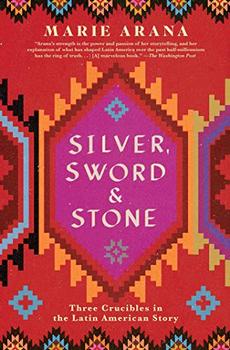Summary | Excerpt | Reviews | Beyond the Book | Read-Alikes | Genres & Themes | Author Bio

Critics' Opinion:
Readers' Opinion:
First Published:
Aug 2019, 496 pages
Paperback:
Aug 2020, 496 pages
 Book Reviewed by:
Book Reviewed by:
Rose Rankin
Buy This Book
This article relates to Silver, Sword, and Stone
 For Americans accustomed to the myth of Europeans settling largely empty lands, where Natives barely featured, it can be difficult to envision the New World as densely populated with Indigenous societies. But in Central and South America, before the arrival of European germs and conquistadors, that was precisely the situation—the Americas contained an estimated 40-140 million people at the turn of the 16th century when Columbus arrived.
For Americans accustomed to the myth of Europeans settling largely empty lands, where Natives barely featured, it can be difficult to envision the New World as densely populated with Indigenous societies. But in Central and South America, before the arrival of European germs and conquistadors, that was precisely the situation—the Americas contained an estimated 40-140 million people at the turn of the 16th century when Columbus arrived.
It's impossible to know the exact number, since the scale of deaths from 1492 onward was so vast and the colonizers didn't record the grisly toll. Devastating diseases that Indigenous peoples had no immunity to, such as smallpox, ravaged the entire continent. Those they didn't kill, the Spanish enslaved, forcing peoples from island tribes in the Caribbean to fallen empires like the Aztecs and Incas, to labor in mines and expropriated lands called encomiendas.
The violence that held the system together was nothing short of genocidal. Blessed by Queen Isabella of Spain, the system of slavery decimated populations while bringing unheard-of wealth to the Spanish crown and the colonial masters in the New World. As Marie Arana explains in her book Silver, Sword & Stone, "Rapacity, gold fever, a desperate courage against overwhelming odds, a hyperinflated sense of superiority, a basic contempt for the Indian—call it what you will—these are the impulses that galvanized them, and the effects on the Indigenous world were cataclysmic."
But the system wasn't without its critics. One friar, Bartolomé de las Casas, brought it to the world's attention and placed Indigenous slavery at the center of raging debates over the nature of mankind when he argued that Indigenous people were in fact fully human in front of Emperor Charles V in 1550, in the Spanish city of Valladolid.
Las Casas was one of the earliest Europeans to settle in the Americas, and as a Dominican friar he was ostensibly meant to convert the Indigenous population to Christianity. In reality, he was granted lucrative lands and numerous slaves, and he became increasingly disgusted as he watched his contemporaries torture and murder the inhabitants of Cuba. He began writing, traveling and preaching—in the New World and the Old—that the Spanish conquest was wrong and immoral, and that the Indigenous people were human and deserved to be converted to Christianity. His argument resonated with young Emperor Charles, who in 1542 passed the New Laws, which banned slavery in the colonies.
These laws, and Las Casas' views, were highly controversial, particularly to the colonial landowners who stood to lose their fortunes and free labor. As the issue grew, eventually Charles was compelled to bring together preeminent scholars of the day to discuss the Spanish colonial system.
Held in Valladolid, this debate featured Juan Ginés de Sepúlveda, considered one of the most brilliant humanists of his time, to argue in favor of Spain's domination of the New World. Sepúlveda used the works of Aristotle to bolster his case—Aristotle was the most respected voice of all the ancient philosophers in Renaissance Europe, and in his Politics he declared that barbarians with primitive cultures could not govern themselves. Consequently, he argued, war against them was justified and it was right to enslave them. Sepúlveda used this claim to support the righteousness of the colonial system.
Las Casas, on the other hand, interpreted the ancient texts differently, and claimed that "the wild and stateless men that Aristotle condemned to natural slavery were not barbarians in the same sense as those who lacked Christianity, but clearly possessed governments, cities, roads, and the other appurtenances of civil life." Sepúlveda cited cannibalism and human sacrifice, both practiced by peoples of the New World, as evidence of their inhumanity and crimes against nature. Yet Las Casas maintained that the violence perpetrated against them was worse, having witnessed it firsthand.
In the end, Charles V sided with Las Casas, and he refused to revoke the New Laws. However, there was no victory in practice, since the New Laws were flouted with impunity in the New World, and Charles himself gave up trying to enforce them as his personal and political problems mounted. Under his son and successor, Phillip II, the encomienda system was fully restored, perpetuating the cycle of violence and exploitation for centuries to come. And as the Indigenous population collapsed, Europeans brought millions of African slaves to replace them as forced labor.
Although a failure in changing policy on the ground, the debate in Valladolid helped begin the larger conversation around human rights, bringing it into the realm of political leadership. From the Spanish colonial period through the French Revolution to the U.S. Civil War and beyond, the arguments made by Las Casas in Valladolid have carried down through the ages.
Portrait of Bartolomé de las Casas by unknown painter
Filed under People, Eras & Events
![]() This "beyond the book article" relates to Silver, Sword, and Stone. It originally ran in September 2019 and has been updated for the
August 2020 paperback edition.
Go to magazine.
This "beyond the book article" relates to Silver, Sword, and Stone. It originally ran in September 2019 and has been updated for the
August 2020 paperback edition.
Go to magazine.





The Flower Sisters
by Michelle Collins Anderson
From the new Fannie Flagg of the Ozarks, a richly-woven story of family, forgiveness, and reinvention.

The House on Biscayne Bay
by Chanel Cleeton
As death stalks a gothic mansion in Miami, the lives of two women intertwine as the past and present collide.

The Funeral Cryer by Wenyan Lu
Debut novelist Wenyan Lu brings us this witty yet profound story about one woman's midlife reawakening in contemporary rural China.
Your guide toexceptional books
BookBrowse seeks out and recommends the best in contemporary fiction and nonfiction—books that not only engage and entertain but also deepen our understanding of ourselves and the world around us.